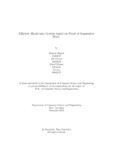| dc.contributor.advisor | Arif, Hossain | |
| dc.contributor.author | Ahmed, Rashad | |
| dc.contributor.author | Ahmad, Alif | |
| dc.contributor.author | Monem, Maruf | |
| dc.contributor.author | Jumana | |
| dc.date.accessioned | 2020-10-18T10:45:03Z | |
| dc.date.available | 2020-10-18T10:45:03Z | |
| dc.date.copyright | 2019 | |
| dc.date.issued | 2019-12 | |
| dc.identifier.other | ID: 15201037 | |
| dc.identifier.other | ID: 19241039 | |
| dc.identifier.other | ID: 19241041 | |
| dc.identifier.other | ID: 16101275 | |
| dc.identifier.uri | http://hdl.handle.net/10361/14064 | |
| dc.description | This thesis is submitted in partial fulfillment of the requirements for the degree of Bachelor of Science in Computer Science, 2019. | en_US |
| dc.description | Cataloged from PDF version of thesis. | |
| dc.description | Includes bibliographical references (pages 49-52). | |
| dc.description.abstract | The use of Blockchain in Cryptocurrency introduces a technology that acts as an
unswervingly growing ledger with the capability to keep an everlasting record of
all the transactions that have taken place, in a secure chronological and immutable
system. It removes dependency on central financial service providers such as banks,
essentially removing the middle-man from the transaction. Bitcoin is one of the
biggest users in blockchain and holds the highest share in the cryptocurrency market.
However, bitcoin has three major problems which are excessive power consumption,
confirmation time and fair reward distribution. Hence, we are proposing a system
where we have tried to reduce energy consumption by limiting the participation of
all the nodes in the network and worked on increasing the propagation speed in
the network. Finally, we have put a lot of emphasis on the concept of fair reward
distribution which is not considered in most cryptocurrencies. Apart from this, we
tried to prove our systems efficiency by comparing the energy consumption with the
two most used crypto currencies Bitcoin and Ethereum mathematically. And have
reached the conclusion, that our proposed system shall reduce energy consumption
by about 80.0% and 46.68% when compared with Bitcoin and Ethereum if each
node in our network consumed the equivalent energy as an average node in the
bitcoin network, on the otherhand, 92.41% and 79.76% if each node in our network
consumed the equivalent energy as an average node in the ethereum network. | en_US |
| dc.description.statementofresponsibility | Rashad Ahmed | |
| dc.description.statementofresponsibility | Alif Ahmad | |
| dc.description.statementofresponsibility | Maruf Monem | |
| dc.description.statementofresponsibility | Jumana | |
| dc.format.extent | 52 pages | |
| dc.language.iso | en_US | en_US |
| dc.publisher | Brac University | en_US |
| dc.rights | Brac University theses are protected by copyright. They may be viewed from this source for any purpose, but reproduction or distribution in any format is prohibited without written permission. | |
| dc.subject | Blockchain | en_US |
| dc.subject | Cryptocurrency | en_US |
| dc.title | Efficient blockchain system based on proof of segmented work | en_US |
| dc.type | Thesis | en_US |
| dc.contributor.department | Department of Computer Science and Engineering, Brac University | |
| dc.description.degree | B. Computer Science | |

